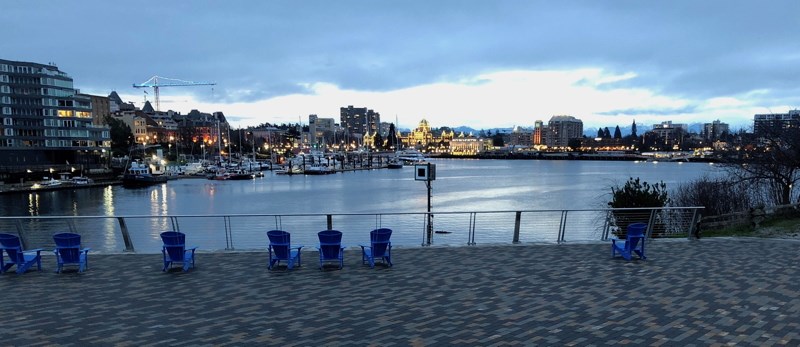Greater Victoria businesses are feeling the impact of the coronavirus.
Anticipating quarantine, customers have been stocking up on items from toilet paper to hand sanitizer and cash. Some businesses have struggled to get merchandise delivered due to supply-chain problems in Asia.
Each day brings new protocols and guidelines for everything from how to run a business to travelling in and out of Victoria.
To prevent the spread of the virus on its ferries and terminals, B.C. Ferries is taking extra measures to clean and disinfect all touch points, including hard surfaces such as tables, handrails, payment pin pads, door handles and elevator buttons, said executive director of public affairs Deborah Marshall.
Passengers who want to self-isolate while on board can remain in their vehicles if they are on an open vehicle deck, but not on an enclosed vehicle deck because of Transport Canada regulations, she said. “On larger vessels that have both an upper and lower vehicle deck, customers are able to remain in their vehicles on the upper vehicle deck only.”
Marshall said it’s too early to tell if ferry traffic has been affected by the virus, though she suggested the ferry system might get extra business at spring break if families decide to travel locally rather than abroad.
“Our traffic was down in January due to severe weather, [while] traffic in February was actually up,” she said.
That has not been the case in Victoria’s Inner Harbour, where both the Coho vehicle ferry and Clipper passenger ferry have seen their reservation numbers drop as a COVID-19 outbreak continues in Washington state.
“We have continued to experience a significant decrease in both short and long-term bookings as well as larger group bookings over coronavirus concerns,” said Clipper spokesman Scott Meis, who noted they have formed an internal task force that meets daily to respond to the directions of health organizations.
At Black Ball Ferry’s Coho, which travels between Victoria and Port Angeles, the crew washes down the vessel and terminals three times daily, while passengers on both vessels are screened by Canada Border Services and U.S. Customs.
Black Ball president Ryan Burles said they have seen a handful of cancellations each day, as they expected.
Paul Nursey, chief executive of Destination Greater Victoria, said most tourism and hospitality businesses are starting to build a 10 to 20 per cent contingency into their budgets for this year by such measures as hiring fewer summer staff.
“We are now definitely seeing a downturn this week. The slowdown is definitely happening,” he said.
Nursey said he has heard of bookings being cancelled, and while the Victoria Conference Centre has not yet had a conference pull out — it has even landed two new pieces of business that cancelled in other cities — it has lost one gala dinner.
Nursey said businesses will have to be more nimble and prudent amid virus fears.
Mike Murphy, who owns 10 Acres Bistro and Common, said it’s too early to say if the slow business at this time of year is just seasonal or due to COVID-19. “[Business] was bad last year at this time as well, but we will have a better idea in a few weeks,” he said.
The Royal Theatre and McPherson Playhouse Society plans to continue with all planned concerts and events. The society said it will continue to follow the guidance of health authorities.
“In addition to our strict cleaning protocols, we are taking extra precautionary measures throughout the theatres. Hand-sanitizing gel pumps are located throughout the theatres and proper handwashing instructions are posted in every washroom,” it said.
As well, custodial staff are disinfecting doorknobs, doors, counters, handrails, arm rests and other commonly touched surfaces daily, the society said, with additional custodial staff assisting with post-show cleaning.
Mike Black, owner of Capital Iron, said businesses that rely on supplies from China have been feeling the effects of the COVID-19 outbreak for weeks.
Items are showing up at stores later than expected as a result of disruptions to the supply chain, he said. “It’s not that they weren’t made, but there are delays in shipping,” Black said. Even products made in Canada are being delayed, as many require parts from places such as China, where the outbreak began.
Black said the effects are likely to be felt for some time, as many stores receive fall and winter inventory in the summer and store it. “All that can be delayed unless they catch up, but the factories are not up to full speed yet,” he said.
Rory Kulmala, chief executive of the Vancouver Island Construction Association, said he hasn’t heard of any direct effects on construction yet, aside from events being cancelled. “Of course, the longer this goes on it will be a question of when, rather than if,” he said.
Kulmala said suppliers will be taking stock of their inventories and trying to source alternative products from different locations.
“Although builders are forging ahead with their projects, I’m sure they are closely looking at their schedules and their material/product requirements and working with suppliers to get those items secured sooner than later,” he said. “Certainly, any delay in the supply chain will impact any current construction projects.”



